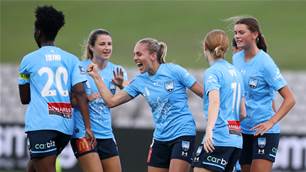Tonight the Matildas and striker Katie Gill are nominated for the National Team of the Year and Women's Player of the Year, respectively, at the 2010 AFC Awards.
 Tonight the Matildas and striker Katie Gill are nominated for the National Team of the Year and Women's Player of the Year, respectively, at the 2010 AFC Awards.
Tonight the Matildas and striker Katie Gill are nominated for the National Team of the Year and Women's Player of the Year, respectively, at the 2010 AFC Awards.
It would be a special achievement in a year where the Australian Women's National Team has come out of the shadow of their male counterparts by winning the AFC Women's Asian Cup, qualifying for the 2011 FIFA Women's World Cup, gaining a runners-up medal at the 2010 Peace Queen Cup in Korea Republic and notching up of nine wins, one draw and three losses.
Leeanne Grantham, the Head of Women's Football at the FFA, couldn't be more pleased. “We are absolutely over the moon,” she said. “It’s just a huge credit to the Matildas.”
“It’s fantastic that the Westfield Matildas have been nominated as Team of the Year and Kathryn Gill nominated as Female Player of the Year.”
For those in the game its no coincidence that the recent success has occurred since the W-League was announced and implemented in 2008. The standard has improved immeasurably in the last three seasons with some of our best kids mixing it with seasoned Matildas and international team.
The beneficiary has been the national team with Tom Sermanni now having a larger talent pool to pick from and several players coming out of the woodwork. All of this was part of the rationale for setting up the League in the first place.
“We have seen a lot more focus by the FFA on women’s football in the last couple of years,” said Grantham. “Most certainly when I started here the opportunity wasn’t to run something for three years but to run something ongoing.”
“From my point of view its got to be forever and now it’s about how you make it sustainable and make sure it has got longevity. That’s always the difficult thing.”
She's right. Women's sport in general and women's football in particular find it difficult to stay afloat and at times is a year by year proposition. Just look at the American League. The US has huge numbers of girls and women playing the sport but their have struggled to make a professional league sustainable. Since its start in 2008, they have lost 3 of their foundation clubs, including two sides who took out the title, and currently only have 6 clubs confirmed their 2011 season.
However, Grantham and the FFA have displayed a more prudent and patient approach to the development of the women's game in this country. “That’s always a bit of a balancing act when it comes to women’s sport and women’s football is included in that.”
“It’s my desire, and I am sure it’s the FFA’s desire, to see the W-League ongoing for a very long time.”
And with the recent success of the Matildas' the importance of the W-League cannot be underestimated.
Related Articles

Updated Again: A-League Women Round 5 and rescheduled games schedule

A-League Women Round 7 schedule













